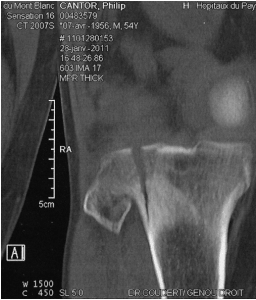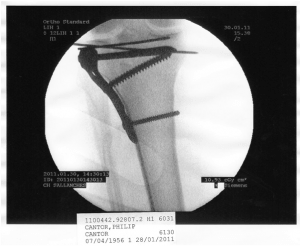
Sibos Diaries 2017: I nearly never walked again.

Sibos Diaries 2017: I nearly never walked again.
It’s only complicated on the inside.
I have metal in my leg. It sets off the metal detectors at airports and I have to explain when they wave their magic wands over me and I hear the monotonous cacophony of beeps that it isn’t my belt, isn’t keys, isn’t a stray mobile phone, is just a piece of titanium I would love to have removed but haven’t. It just means I can walk.
I mentioned in a recent Sibos blog it was six years ago we were last in Toronto. Writing that brought back to me these, more painful, memories of 2011.
If you’re squeamish, look away now. But if not, you should be able to see from the X-ray that a whole wedge of my tibia nearly broke away, exactly one week after my 33rd Wedding Anniversary. Foolishly I insisted on my friend driving me from the slopes of Flaine to the hospital where they soundly berated me for not calling an ambulance.

I was convinced it was a small thing, “strap me up!” I said, “and I’ll be on my way!” After all, I had bought corporate hospitality tickets to see the World Cup at Chamonix the very next day with my wife and best friends for €1,500. “I’m not missing that
M. Coudert, who had also a few years previously filled my leg with metal (same leg), came and saw me late that Friday night. “Je veux vous expliquer la gravité de la situation” he said Woah.
He went on, in English, “I will not operate tomorrow. Tomorrow we are busy. I will operate on Sunday morning, first thing. I want to be fresh for such a long and complex challenge.” That’s not good. When a surgeon (and especially one as talented as M. Coudert, whose location at the foot of Mont Banc means he probably butchers and fixes up more broken bodies than anyone else in the world in the shortest of orders) needs a night’s rest to have a run up at treating you, it’s time to worry a tad.
Surgeons are not noted for their humility nor their generosity to fellow practitioners. But when I returned to one of the finest knee surgeons in England at the Oaks Hospital in Colchester, he heard what had happened and said “well you will have osteoporosis for sure, if there is any cartilage left at all, you should have come straight home, not let these non-specialists operate on you, this is a very tricky one and he will not have been able to avoid the metal fouling your femur, I’m really quite…oooh look at that” as he saw exactly how M. Coudert had skilfully fashioned ironwork to rectify the leg and make it whole but avoid encroaching on either the cartilage or the upper bone of the knee joint, notoriously the most complex joint in the human body.
“He’s done a great job!” he enthused, as I fell off my chair at such unlikely praise.
Its only complicated on the inside.
So, six years on and you will not see me hurrying or running often and I may occasionally pause a moment. Being in charge of Sibos calls for many things, often to be done quickly, but I have learned that calmness matters and there are few things that need precipitous energy. A friend of mine hadn’t really worked this out last year and was dashing hither and tither in a perpetual state of ither. “Ooh, Phil” he complained to me, “it’s dreadful, my feet are killing me.” My point is, less is more, do things well and fast, but calmly, he who hesitates is lost but also look before you leap, you only live once but if a thing’s worth doing, it’s worth doing well and, going back 2,000 years, the Romans had this one cracked, they said “festina lente” or, “hurry slowly.”
So as, in the Latin style, as we creep (or rush) ever nearer to Sibonius Torontonius, I begin to get a bigger perspective. We have had 400 years of banking that were (literally) a licence to print money, and my j’accuse, for the last thirty-two years since I first joined a bank, has been that banks offer up their back office capabilities just on the off chance that their corporate clients might want to avail themselves of those, share in the thrill of doing what only a banking licence let’s you do, learn banking lingo, be a banker for a moment (and many treasurers are, indeed, bankers manqués) and go at it, fill in that Swift field, play that CHIPS/CHAPS/KEPPS etc acronym game.
But in my simple, metal-knee but invisible-from-the-outside world, I look for something simple on the outside and tailored to the context.
Businesses come in all shapes and sizes. But what they have in common is they all want to buy, to sell, to do that safely, to have the funds to buy and to use the proceeds of sale correctly. It’s crucial, this, so I’ll repeat myself. The core need is to buy, sell, safely, have the funds to buy and use the proceeds of sale wisely.
Please note I have not, here, mentioned a single banking “product.” No sweeping, no trade finance, no collections, no supply chain finance, not even payments, that most fundamental and precious of banking capabilities. Of course, all those things are available and matter hugely (indeed, it’s what we in iGTB provide software for, brilliantly I might add, in my humble opinion and in the opinion of a fast-growing number of banks), but the point is, that’s not the context. The context is for that specific moment and action, based on the data available at the time and AI and NLP techniques to anticipate, for buying (yes buying does need payments and, I might include especially buying labour, whose payment we call salaries, that strange single-debit-multi-credit-multicurrency/FX-authorise-without-seeing-beneficiary-name beast), selling (yes selling needs collections to avoid the curse of cash flow bingo bankruptcy), safety (eg trade finance to make sure of what you’re buying), funding buying (position keeping, sweeping, supply chain finance, dynamic discounting, you name it) and wise usage of the proceeds of sale (deposit management, investment sweeps, treasury). We, and a growing band of fellow advocates, call it Contextual Banking.
It’s not the metal that counts, it’s the skill with which it’s used and kept hidden. Do it right and, as I said, it’s only complicated on the inside.
So, if I can stretch the analogy perhaps a little too far, let’s move our thinking away from the metal in the leg (the digital, the sweeping, the trade finance, the collections, and so on) and concentrate instead on how the patient (ie client) can actually function as supposed to (buy, sell, safely, funds, proceeds) well, then, maybe then, we’ll be able to cast off 400 years of customer uncentricity and actually do what will help businesses grow, help create wealth, help economies, help meet government funding gap targets, help everybody benefit and maybe even make a tiny dent in the unbanked, in poverty, in the aspirant village SME, in the large MNC and, at the risk of being ridiculously fanciful, allow banks to be – well if not liked, exactly, by the population – at least respected, more.

I did. But I’m lucky. It’s an inconvenience, no more. Plenty are much less mobile. My memento mori is my good colleague Razia, whose childhood polio trims her mobility much more but from whom no-one has ever heard a peep of complaint or regret, let alone self pity.
“I would like to explain to you how grave your situation is.”
Indeed. I did get to watch the World Cup. Some of it. On television, on the ward. Indeed, soon after it started, I saw Manuel Osborne-Paradis, whom I had watched in person do the practice run the day before very successfully, hurl himself and his two long plans of carbon fibre down the infamous Khandahar at breakneck speed, fall, literally not breakneck I hoped, and two minutes later saw the helicopter land and bundle him in so they could carry on, and two minutes later again saw through my hospital window next to me that same helicopter land and medicos remove him on his stretcher and rush him into the hospital a few doors down. I do hope he had the same surgeon.
Though I am much less riven with pain than my colleague, whose difficult knee legacy stems from his basketball-stardom past.
I’ve heard of that. It’s called shoeicide.
No matter what James Bond says.
Hear this explained properly, not bloggily, and using AI, NLP and machine learning, on Sibos Tuesday (17th October) at 5pm at Open Theatre One.
Phil Cantor’s blog































